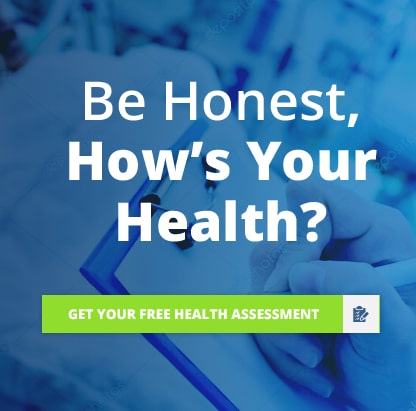Learn Why, and How to Use the Gut-Brain Connection to Your Advantage.
It’s no secret that our brains and stomachs are deeply and instantly connected: a piece of shocking news can immediately “ruin lunch” for us in a very literal way, and the euphoria of being in love feels like a wonderful lightness in our guts – like butterflies in our stomach.
Most of the time, this connection feels one-directional: that is, strong emotions from the brain speed down towards our gut. But did you know this link goes both ways? Experts call this “the gut-brain connection”, and it offers us a completely new way to look at our bodies and to take control of our health.
How the Gut-Brain Connection Works
The “gut-brain connection” describes how these two organs are connected, and how the health of one can impact the function of the other.
Think of this like the cable that connects your USB headset with your computer. Most of the time, you use this cable to send music from your computer directly to your ears. However, when it’s time to jump to a video call, you will be able to send your voice through your mic back to your computer, and from there, into the internet.
Just like your headset relies on a USB dongle on one end, and a microphone on the other, the gut-brain connection also has two key gadgets that can send information between them:
1. Your gut microbiome
The gut microbiome is a collection of billions of beneficial bacteria that live inside your stomach and intestines. These bacteria are continuously feeding off the food inside your stomach. In return, they excrete tiny pieces of proteins and hormone-like compounds.
This “bacterial excrements” is a truly rich gift! It helps you break down food more easily, make some micronutrients easier to absorb or build additional protein blocks.
2. Your enteric nervous system (ENS)
The enteric nervous system (ENS) is a network of over 1 billion nerve cells, spread in two layers that line your entire intestinal tract. Here, they carry orders from the brain that can help speed up digestion or abruptly halt it. In addition, these nerves can also “read” the chemical signals sent by your gut bacteria, and send them back to your brain, a sensory nerve perception.
Your gut-brain connection relies on a very delicate and complex balance. We still don’t know its full potential, but it is now known to deserve the nickname of “second brain”. One thing is certain: the more varied bacteria in your gut microbiome, the stronger their impact on your enteric nervous system will be.
Why Should You Nurture your Gut-Brain Connection?
It is only during the past 60 years that we began to understand that gut bacteria wasn’t simply harmless – but something we should care for. A strong gut-brain connection, then, can affect all of the following:
Your Mental Health
It appears that the small signals from your gut bacteria to your brain can affect your mood and mental health.
Several studies have shown that, by increasing the amount of specific intestinal bacteria, people with either anxiety or depression can noticeably improve their symptoms.
For example, in this 2020 study, a group of patients who had both Irritable Bowel Syndrome (IBS) and major depressive disorder were instructed to take either a standardized probiotic supplement or a placebo. Those who took the probiotic were twice as likely to report improved sleep, energy levels, and happier moods.
Several other studies have identified up to 4 different types of gut bacteria that seem to influence the way we perceive stress, as well as our likelihood of developing anxiety symptoms.
Your Attention and Memory
The mechanisms behind these are not completely clear yet, but it seems that the composition of your gut bacteria can affect your ability to concentrate and form new memories, especially during times of stress.
One possible reason for this is that gut bacteria can affect the levels of inflammation in your body. Inflammation processes could be one of your body’s defense mechanisms against infection.
Chronic stress and constant anxiety can cause long-term, low-level inflammation – the same one that is behind developing high blood pressure. This can harm your heart health and diminish your mental resilience (that is, your ability to withstand stress and to go back to normal after it).
How to Harness your Gut-Brain Connection for Good
The close friendship between our gut and our brain can affect moods, energy levels, and overall health. It is up to us to find ways to ensure this impact is positive.
The simplest way to do this is by enhancing our microscopic gut residents. The nourishing foods we eat, and the snacks we avoid, can all help us ensure we increase the number of useful bacteria inside us.
Here are 3 ways to do this:
1. Skip the processed snacks
Highly processed foods, full of artificial flavorings and sugar, are a favorite of some detrimental types of bacteria, such as Lactobacillus helveticus ROO52.
Sugar-free but flour-laden snacks are no better, as they tend to contain high amounts of gluten, which can worsen IBS and foster unfavorable gut bacteria.
2. Eat more probiotic foods
Foods with live bacterial cultures (such as natural yogurt) can help you increase the diversity of your gut’s inhabitants. Even in the short term, probiotics can help you digest food better and diminish the symptoms of IBS.
What other probiotic foods are there? One of the best-documented (and easiest to find) sources of probiotics are fermented foods. This can include sauerkraut, kimchi, kombucha, and even (if you are not ready to give up on gluten just yet) homemade sourdough bread.
Finally, a commonly overlooked source of probiotics comes directly from the ground: edible mushrooms can easily carry beneficial bacteria on them, alongside a wide variety of useful micronutrients. For example, shiitake mushrooms are a great source of vitamin B6, which is great for serotonin production and increasing memory.
However, don’t stick to one kind: your gut bacteria loves variety, so consuming a wide variety of mushrooms can provide extra benefits.
3. Adding a side of healthy fats
Healthy fats and a healthy brain are a pretty established “health pairing”. In addition to cold-water fish, there are three main plant-based sources of healthy fats you should seek out: olive oil, avocado (in oil or as guacamole for extra vitamins), and tree nuts.
Tree nuts come with the extra benefit of large amounts of zinc, which provide an extra boost to brain health. Finally, sesame seeds contain large amounts of tyrosine, an essential amino acid that is used to produce the feel-good hormone dopamine.
Final Thoughts
The impact that gut bacteria can have on the rest of our bodies (from immunity to heart function) cannot be overstated. In particular, the link between gut flora and brain function seems particularly promising, especially for those who suffer from anxiety, depression, or Irritable Bowel Syndrome.
If you are looking for a holistic and natural way of battling these diseases or simply want to improve your resistance to stress, take care of your gut microbiome. You can do this by keeping a healthy diet, with fewer processed foods and more plant-based healthy fats.
Think differently about your health with Society of Wellness. Get your free health assessment here.


